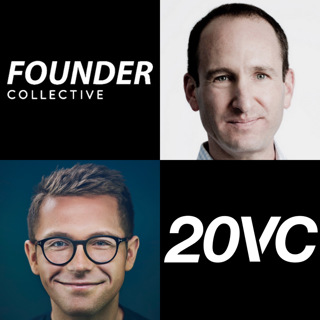
20VC: Biggest Lessons and Challenges Building One of the Most Successful Seed Funds, How To Manage Investor Psychology, Self-Doubt and Insecurity & The Secret to Truly Successful Venture Partnerships with David Frankel, Co-Founder @ Founder Collective
David Frankel is a Co-Founder and Managing Partner @ Founder Collective, one of the great seed firms of the last decade with a portfolio including Uber, Coupang, Airtable, Whoop and many more incredible companies. Previously, David was Co-Founder and CEO of Internet Solutions (IS), the largest ISP in Africa, ultimately acquired by NTT. David is also a founding board member of Endeavor SA and in the past has been selected by the World Economic Forum for the Global Leader of Tomorrow (GLT) program. In Today's Episode with David Frankel You Will Learn: 1.) How David made his way into the world of angel investing? How his mindset changed when making the transition from angel to an institutional investor with the founding of Founder Collective? 2.) Building the Firm: Founder Collective What are the biggest challenges in venture firm building today? Why is "deploy" and "the game" banned as words within Founder Collective? What terms are promoted as an alternative? How does David construct investment decision-making in the partnership? How does David create a safe space where all team members can share their thoughts in a non-judgemental, safe environment? What are the biggest mistakes or challenges that David sees firms make when building? 3.) David Frankel: Investor Mindset How does David analyse the current seed market today? What does he like? What worries him? Does David agree that early stage investing has never been less collaborative? How does David reflect on his own relationship to price today? How does he determine when to pay up vs when not to? How does David think about the compression on fund deployment timelines? Will this change? How does David keep a fresh and clean mind when viewing new opportunities, having seen many work and not work? How does one retain that mental purity when investing? What have been some of David's biggest misses? How did it impact his style of investing? 4.) The Partnership: What was the most recent disagreement David had with the partnership? How was it resolved? How does David approach self-doubt and insecurity within the partnership? How can this be managed successfully? What have been some of David's biggest lessons on how to give effective feedback without being judgemental? In a world of Zoom, how did the partnership retain the same level and quality of connection that they had in person? What works? What does not work? Item's Mentioned In Today's Episode with David Frankel David's Favourite Book: The Code Breaker: Jennifer Doudna, Gene Editing, and the Future of the Human Race David's Most Recent Investment: PairTree
7 Feb 202243min
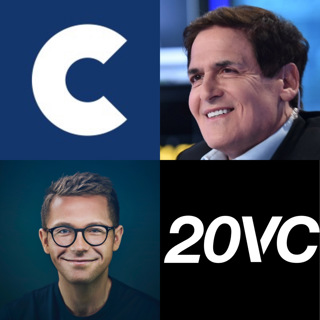
20VC: Mark Cuban on Reshaping the Pharmaceuticals Industry, How To Hire and Build Truly Great Teams and What Brand Really Means Today and How To Build One Successfully
Mark Cuban is a serial entrepreneur, investor, and owner of the Dallas Mavericks. Today we are focused on Mark's latest entrepreneurial endeavor, starting Mark Cuban's Cost Plus Drug Company, the online pharmacy taking out the middlemen, meaning no price games and huge drug savings. As mentioned, Mark is also the proud owner of Dallas Mavericks, since his taking over they have competed in the NBA Finals for the first time in franchise history in 2006 – and became NBA World Champions in 2011. Before Dallas Mavericks, Mark co-founded Broadcast.com – streaming audio over the internet. In just four short years, Broadcast.com (then Audionet) was sold to Yahoo for $5.6 billion dollars. If that was not enough, Mark is also one of ABC's "Sharks" on the hit show Shark Tank. In Today's Episode with Mark Cuban You Will Learn: 1.) Cost Plus Drugs: Origin Why Mark decided to build Cost Plus Drugs? Why has no one done it before? How does Mark think about resource and time allocation with Cost Plus? 2.) Building the Team: Hiring How does mark analyze his approach to hiring? Where is he weak? Where is he strong? What one motto does Mark always use when it comes to hiring? What is the most common mistake Mark sees founders make when it comes to team build? How does Mark identify stress removers? What are the core signals? 3.) Brand + Capital + Business Strategy: Why is the current cost structure of healthcare so damaged in the US? How does Cost Plus change this? How does Mark think about what it takes to build great brand today? Why will Cost Plus not be doing big TV and traditional media advertising? What types of guerilla marketing is Mark most excited by? Why will Mark never have a billboard in Times Square? 4.) AMA with Mark Cuban: What 3 traits does Mark most want his children to adopt? What worries Mark most today? What are Mark's biggest strengths? What are his biggest weaknesses? What single purchase has brought Mark the greatest joy?
4 Feb 202230min
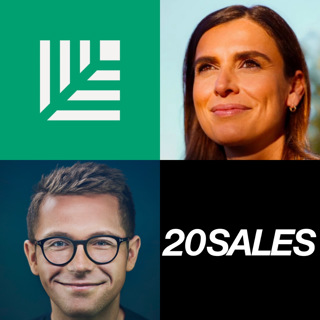
20 Sales: How To Build Sales Teams with a Product-Led-Growth GTM, What is a Sales Hiring Scorecard and How To Construct Yours & How To Structure the Onboarding Process for all New Sales Hires with Dannie Herzberg, Partner @ Sequoia Capital
Dannie Herzberg is a Partner @ Sequoia Capital and one of the great sales leaders of the last decade. Prior to entering the world of venture, Dannie spent 4 years at Slack as their Head of Enterprise Sales, there Dannie built & scaled the self-serve / SMB, mid-market, and enterprise sales orgs across the Americas as Slack grew from $100M - $1B in revenue. Before Slack, Dannie spent over 5 years at Hubspot building sales, opening an SF office, and then joining product to launch CRM & platform. In Today's Episode with Dannie Herzberg You Will Learn: 1.) How Dannie got her first job in sales at Hubspot through being a waitress in a Boston Diner? What were her biggest lessons from her 5 years scaling sales at Hubspot? How did Dannie's 4 years at Slack impact her operating and sales mindset today? 2.) The Playbook: Does the founder need to be the one to create the sales playbook? When is the right time to bring in the first sales hire? Should they be a sales leader or rep? When is the right time to bring in a CRO, sales enablement and revenue ops? What are the single biggest mistakes founders make when hiring their first in sales? 3.) The Hiring Process: How should founders structure the hiring process for their first sales hires? What should be achieved or learned in each consecutive interview? How can founders use sales case studies most effectively? What are early signs of a 10x sales hire? What are red flags to look out for in the process? 4.) Sales Onboarding: What does the ideal onboarding process look like for new sales hires? What tasks and duties should all sales hires perform in the first 60 days? What are early signs that a new hire is not performing to the right standard? How does the first few months differ for sales reps when comparing a product-led-growth company to an enterprise company? How can new sales hires really engage with broader functions within the team in the first 30 days? Item's Mentioned In Today's Episode with Dannie Herzberg Inbound Marketing, Revised and Updated: Attract, Engage, and Delight Customers Online
2 Feb 202246min
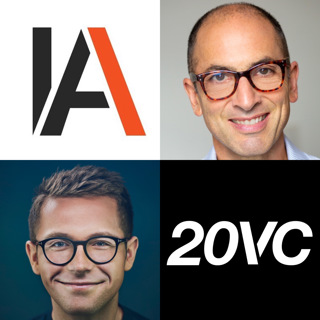
20VC: How Startup Valuations, Fund Deployment Cycles, M&A and IPO Markets Will All Change in This New Market, Where Will The Biggest Crunch Be, When Is The Right Time To Be Aggressive vs Conservative with Roger Ehrenberg, Founding Partner @ IA Ventures
Roger Ehrenberg is a Founding Partner @ IA Ventures, one of the most successful seed funds of the last decade with $475 million across their four funds. Previous investments include The Trade Desk, Datadog, Digital Ocean, Wise and Recorded Future. Most recently, Roger took a step away from the day-to-day running of the firm, since he started IA Sports Partners, investing in sports franchises and other sports-related assets. Last month, Roger, alongside his two sons, started Eberg Capital, an investment vehicle focused on web3, crypto, NFTs and next-gen infrastructure. In Today's Episode with Roger Ehrenberg You Will Learn: 1.) How Roger made his way into the world of angel investing and venture having had a successful career on Wall St? How did seeing the booms and busts of the dot com and 2008 impact his investing mindset today? How does today compare to those times? 2.) The Investor Mindset: What is Roger's #1 rule when it comes to managing investor psychology in volatile times? What does Roger do to calm his mind and prevent worry and fear when markets crash? What works? What does not work? How does one assess how close we are to the bottom? Why does Roger believe there is more "blood on the streets to come"? When does Roger believe is the right time to pullback vs when to be aggressive in deployment? What company profiles will do well vs poorly moving into this new cycle? 3.) Investing Strategy: How does this new market impact the three different investing categories; early, Series A & B and growth? Why does Roger believe deployment timelines will be extended? How will pricing be impacted? Why does Roger believe that the Series A & B crunch is the most worrisome? How will their bar for what makes a great company change? Should early stage managers alter their reserves strategy in the face of more stringent Series A rounds? Why does it not make sense to invest in "pay to play" rounds? How does Roger adivse the companies that he works with today on burn vs growth? 4.) AMA: How does Roger evaluate his own relationship to money today? How has it changed over time? What does Roger believes makes a truly successful marriage? What can one do to foster extreme trust and safety in a marriage? What does Roger believe have been some of the biggest insecurities he has had to overcome over the last decade? How did he overcome them? Item's Mentioned In Today's Episode with Roger Ehrenberg RIP Good Times by Sequoia Capital
31 Jan 202244min
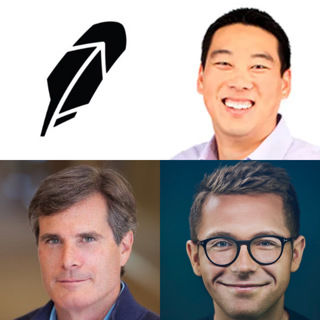
20VC: The Robinhood Memo: The Early Metrics That Showed Robinhood was a Breakout Company, The Cost Structure of Robinhood in the Early Days and Why it is a More Efficient Business than eTrade & How Vlad Has Developed as a Leader Over Time with Rick Yang a
Scott Sandell is the Managing General Partner of NEA, one of the leading firms of the last 3 decades with now close to $24Bn under management and a portfolio including Salesforce, Robinhood, Plaid, Databricks and more. As for Scott, since joining the firm in 1996 he has led investments in Salesforce.com, Tableau Software, WebEx and Workday and serves on the board of Robinhood, Cloudflare, Coursera and Divvy to name a few. Rick Yang is a General Partner and Head of Consumer Investing @ NEA, since joining in 2007 he has led investments in the likes of Masterclass, Plaid, Robinhood and many more. In Today's Episode with Scott Sandell and Rick Yang You Will Learn: 1.) How Rick came to meet Vlad, Robinhood Founder, for the first time? What impressed Rick most in that first meeting? How did the internal discussions proceed at NEA? Was it a unanimous decision to make the investment? 2.) The Market: How did Rick and Scott evaluate the market at the time? Bottoms up, top down? How did the market change and evolve both in ways they did and did not expect? How do Rick and Scott evaluate market timing risk today when investing? How did Rick and Scott approach outcome scenario planning with Robinhood? 3.) The Traction: What core signals and datapoints made Rick realise Robinhood had product-market-fit? How did Rick and NEA analyse Robinhood's early organic customer acquisition? How did the board advise on how to spend their first marketing dollars? How does the cost structure of the business compare to Charles Swaab and eTrade? Why is Robinhood such a superior model? 4.) The Team: How has Vlad evolved and developed as a leader over time? How did Vlad handle the 36 hours in Feb 2021 when he had to go and raise $3BN+? Who is the unsung hero of the Robinhood team? What have they done to deserve this?
28 Jan 202231min
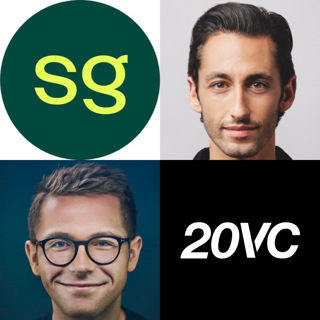
20VC: Sweetgreen Founder Jonathan Neman on Leadership Lessons from Managing Through COVID, The Importance of Failing Fast and Iterating & How the Best Leaders Bring Together Brand, Capital Allocation and Strategy
Jonathan Neman is Co-Founder & CEO of Sweetgreen, the mission-driven restaurant brand that serves healthy food at scale. Alongside his co-founders, Jon has scaled Sweetgreen from one small restaurant to one of the US' leading food brands with over 5,000 employees, over 140 locations and $300M+ in revenue. If that was not enough, Jon is also an active board member of MeUndies. In Today's Episode with Jonathan Neman You Will Learn: 1.) How Jon took the decision to leave his "dream job" as a consultant at Bain to start Sweetgreen? What did his Bain boss tell him that persuaded Jon it was the right decision to leave? How does Jon think about and advise people when it comes to choosing the safe vs the risky path? 2.) How Sweetgreen was not an Overnight Success: At what moment did Jon really not think that Sweetgreen would make it? Why? How did he deal with those moments of intense stress and pressure? How does Jon test for true grit and resilience both in hires and in founders today? 3.) Brand + Capital + Business Strategy: How does Jon think deeply about what brand means today? What did Sweetgreen do right when it comes to their brand building? How did they marry art and science in the right way? What do the unit economics look like on a per store basis? What is the payback period on a per store basis? How has this changed over time? How does the store design impact the profit per store? How has store design changed over time? What have been some of the biggest lessons in terms of when, where and how to open new stores? 4.) Leading Through COVID: What were some of Jon's biggest lessons from leading a consumer brand through COVID What were some of the toughest elements for Jon? How did he overcome them? How can founders bring people along with their thought process and inspire? Who is Jon's biggest mentor? What has he learned from them? Item's Mentioned In Today's Episode with Jonathan Neman Jon's Favourite Book: Thinking, Fast and Slow: Daniel Kahneman
26 Jan 202244min
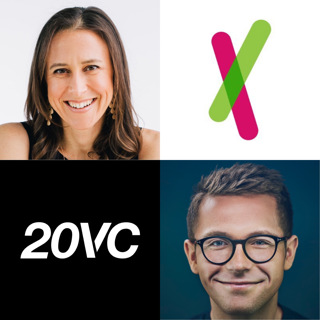
20VC: 23andMe's Anne Wojcicki on How To Approach Trust in Business and Personal Relationships, Leadership Lessons from Sheryl Sandberg and Reflections on How The Best Founders Manage Their Boards
Anne Wojcicki is the Founder & CEO @ 23andme, offering DNA testing with the most comprehensive ancestry breakdown, personalized health insights, and more. To date, Anne has raised over $1BN for the company from the likes of Sequoia, GV, NEA and many more incredible names. Prior to founding 23andMe, Anne spent a decade on Wall Street investing in healthcare and felt frustrated by a system built around monetizing illness instead of incentivizing prevention. If that was not enough, Anne is also on the board of Cazoo and The Anne Wojcicki Foundation and is an active angel investor with investments in the likes of Embark and Maven Clinic. In Today's Episode with Anne Wojcicki You Will Learn: 1.) How Anne made her way from Wall St healthcare investing to founding one of the leading healthcare companies of the last decade in 23andme? 2.) Trust and Friendship: How does Anne determine whether someone is genuine or is being transactional? What are the signs? How does Anne approach trust in relationships? Start from a base of full trust and it is to be lost or start with none and it is to be gained? What does Anne believe are the core of the best and most healthy relationships she has? 3.) Leadership: How does Anne reflect on her own decision-making processes today? How does Anne create a safe space where her team feel they can pushback on her and tell her how they feel? How does Anne approach internal role migration? What does Anne do to get the very best out of her team? How has Anne's leadership style changed over the years? How has being on the board of Cazoo changed how Anne reflects on her own board leadership? What have been some of her biggest lessons from Alex Chesterman? 4.) AMA: What is the hardest element of Anne's role with 23andme? What is Anne's morning routine? What 3 traits would Anne most want her children to have? Anne can have a billboard anywhere, what do it say on it and why? What would Anne most like to change in the world of healthcare over the next decade?
24 Jan 202241min
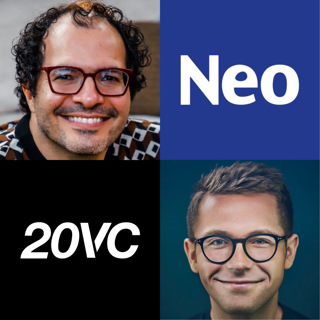
20VC: How I Lost a $125M Deal with Yahoo by Being Too Honest, The M&A Meeting with Steve Jobs That Did Not Go Well and How U2's Bono Saved The Day For One Tech Startup with Ali Partovi, CEO @ Neo
Ali Partovi is the CEO @ Neo, a mentorship community and communal VC fund that announced their new $150M fund last year on the back of early hits from Fund I including Vanta and Kalshi. As an angel, Ali has made personal investments in Dropbox, Uber, Airbnb, Facebook, Convoy and many more. Prior to investing, Ali founded 2 companies, the first; LinkExchange which he sold to Microsoft for $265M in 1998 and the second, iLike which was acquired by Microsoft in 2009. In Today's Episode with Ali Partovi You Will Learn: 1.) How Ali made his way into the world of startups with the founding of his first company? How Ali made his way into angel investing and then starting and raising Neo, as a fund? 2.) How To Kill a $125M By Being Too Honest: How did Ali lose this $125M with Jerry Yang and Yahoo? What led Ali to believe that Paul Graham was so special in 1995? What would Ali have done differently with the benefit of hindsight? How does Ali feel about investment misses today? What are his biggest misses? How has it impacted his mindset and approach to investing? 3.) The Meeting with Steve Jobs Did Not Go Well: Why did the meeting with Steve Jobs not go well? What was wrong with the way Ali phrased his final statement? What did this teach Ali about how founders should communicate the difference between hype and reality? What did this experience teach Ali about how founders should run both fundraising and M&A processes? How does Ali build trust with every touchpoint? 4.) U2, Airbnb and Google at Seed: How did Bono come to save the day for Ali for his startup in 2009? What did this teach Ali about how to frame risk and when to go all in vs hold back? How did Ali miss investing in the seed for Airbnb? How did he make up for it with a later investment? How did Ali come to miss investing in the Google seed round? Does FOMO haunt Ali today? Item's Mentioned In Today's Episode with Ali Partovi Ali's Favourite Book: Sapiens: A Brief History of Humankind
21 Jan 202240min






















